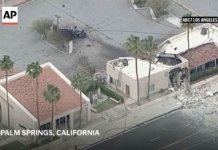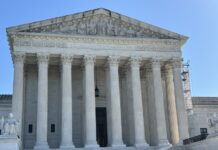
(Georgia Recorder) — The Georgia Secretary of State’s office confirmed that it is investigating an election security analyst tied to a 2020 Coffee County voting system breach who recently claimed that he also forensically examined voting equipment in Macon-Bibb County.
According to March 11 sworn testimony filed with the U.S. Supreme Court forensic analyst Benjamin Cotton mentions Bibb County among the several locations across the nation where he examined components of the Dominion Voting System that have been used in statewide elections in Georgia since 2020.
The electronic voting systems in Georgia and several other battleground states have become the target of right-wing activists who sought to gather evidence that compromised Dominion’s ballot tabulators, servers and touchscreen ballot marking devices resulted in the 2020 presidential election being stolen from Donald Trump.
In a March 28 letter to the State Election Board, Marilyn Marks, executive director for the Coalition for Good Governance and senior election security advisor for Free Speech For People, urged election officials to immediately begin investigating Cotton’s claim about Bibb County voting equipment.
According to Marks, it is critical that the board’s independent investigation of Bibb’s election equipment take place in light of the Secretary of State’s lack of urgency in the investigation of Coffee County, which was part of a coordinated multi-state voting breach following the 2020 election.
“We respectfully encourage the SEB to independently conduct its own investigation into the alleged voting system breach in Bibb County given the failure of the Secretary of State to detect and investigate the voting system breach in Coffee County,” the letter reads.
“Mr. Cotton’s sworn statement that he had access to the Dominion Voting system components from Bibb County is credible enough to warrant immediate investigation given that he had accurately stated in a previous declaration that he had obtained and analyzed the software taken from Coffee County, Georgia before that software breach was publicly known,” the letter states.
“If the Dominion voting system components in Bibb County are reasonably suspected of having been compromised, they should be immediately isolated and replaced before voting preparations begin for the primary elections,” the letter continues.
State Election Board Chairman John Fervier said members will not comment on the allegation while the Secretary of State’s office investigation is underway.
“Once the investigation has been completed, then the SEB will be in a position to hear the facts of the case and make a determination as to what actions, if any, might be necessary,” said Fervier, who was appointed by Gov. Brian Kemp in January as election board chairman.
The Macon-Bibb County Board of Elections issued a statement denying that its election equipment had been illegally accessed by Cotton or any other unauthorized people.
The election board said it didn’t become aware of Cotton’s allegations until after his testimony on March 11, stating that he had “forensically” examined components of Dominion systems in Bibb, as well as in Arizona, Michigan, and Pennsylvania.
Macon-Bibb election supervisor Tom Gillon said that only state elections board employees authorized Dominion Voting System staff, and Georgia Secretary of State representatives have been allowed access to the county’s voting system.
“We have had Open Records Requests for certain reports and files in the past but have only supplied those that have been authorized by the SOS office,” Gillon wrote in an email on Monday. “None of those requests seem to have come from Mr. Cotton or his company, but that would be hard to track if it was requested by someone on his behalf.”
In a recent email exchange with a secretary of state investigator, Cotton’s attorney, Kurt Olsen, wrote that Cotton did not access confidential information but only reviewed Bibb County’s backup election database that was provided by the county under an open records request.
Olsen’s response came after state investigator Charlene McGowan questioned Cotton’s claim that the only information he had analyzed from Bibb came from publicly available records. Cotton only mentions Bibb County once in his Supreme Court deposition and doesn’t explain how or when he was able to access the equipment or to what extent he was able to examine the system.
“Your client previously signed a sworn declaration stating that he had forensically examined voting equipment in Coffee County, Georgia–not Bibb County. Our investigators reached out to you for an explanation for this discrepancy and were told that Mr. Cotton reviewed information he received from Bibb County in response to a FOIA request,” McGowan wrote. “However, this is contradictory to his sworn testimony that he “forensically examined [voting system] components.”
Olsen wrote on April 11 that his client hasn’t made contradictory statements about what election information was available to him from Bibb.
“The Bibb County backup election database, which is public data, is precisely what Mr. Cotton forensically examined. An election database is a ‘component’ of the election system,” Olsen said in a March 28 email. “There is no ‘discrepancy’ in Mr. Cotton’s sworn testimony.”
Cotton’s comments about Bibb came from testimony given in support of the petition filed by former Arizona gubernatorial secretary of state candidates, who are asking the Supreme Court to overturn their 2022 election losses based on allegations the Maricopa County scanners used to tabulate votes were susceptible to hackers.
The Georgia Republican Party and Arizona Republican Party have also filed a brief in support of having the U.S. Supreme Court take up the Arizona plaintiff’s case ahead of the Nov. 5 election. The 9th Circuit Court of Appeals and a federal court judge have dismissed the plaintiff’s claims as frivolous and based on conjecture.
Judge Amy Totenberg of the United States of the Northern District of Georgia is expected to rule on a longstanding lawsuit filed by the Coalition For Good Governance and several other plaintiffs are contend the state’s electronic voting system is vulnerable to breaches caused by outsiders gaiting unauthorized access and other cybersecurity threats that could be used to manipulate Georgia’s elections.
The plaintiffs are asking Totenberg to declare the electronic ballot marking devices as unconstitutional and to replace them with some variation of paper ballots.
Cotton, the founder of the digital forensics company CyFIR, and Doug Logan, the CEO of the Florida-based firm, were both connected to a Coffee County voting breach that occurred in the weeks following the 2020 election. The breach led to charges filed in the Fulton County 2020 election interference case against a former local election supervisor, an-ex Coffee GOP leader and an Atlanta bail bondsman for allegedly allowing a team of computer science experts access to confidential voting equipment.
Logan and Cotton were later hired by the Arizona Senate to conduct the partisan “audit” of the 2020 Maricopa County election. The two men were among multiple people investigated in Michigan on allegations of participating in an orchestrated plan to gain unauthorized access to several voting tabulators in early 2021.
The case would result in criminal charges being filed against an ex-Michigan Republican lawmaker and a former GOP candidate for attorney general; however, Cotton and Logan avoided any criminal charges after a special prosecutor said that some of the defendants deceived local election clerks and forensic experts who analyzed the equipment.







